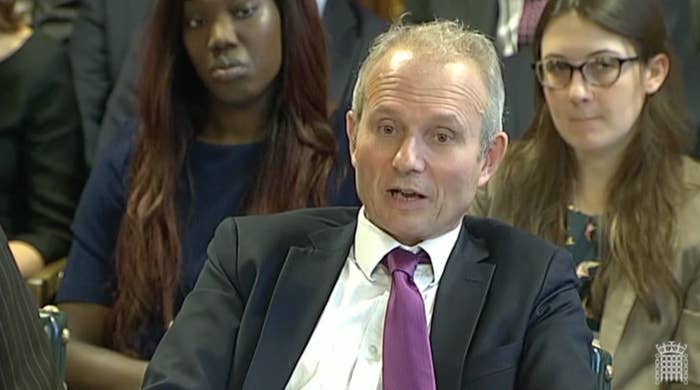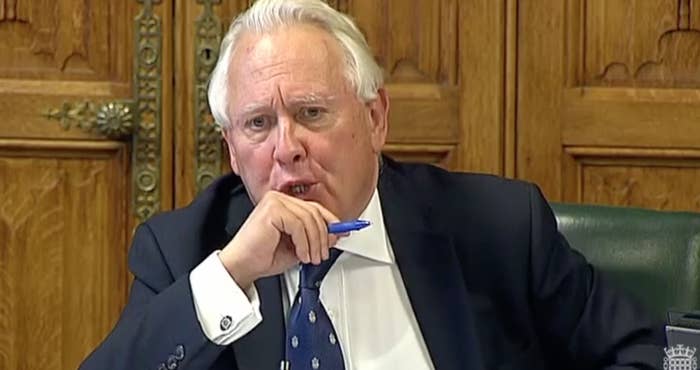
The government will announce a review of the impact of its cuts to legal aid in “the very near future”, the justice secretary told MPs today.
Giving evidence to the justice select committee for the first time since becoming justice secretary, David Lidington also said his department would consider providing an early legal advice service.
His admission comes after a series of articles by BuzzFeed News about the huge impact the cuts had made since they were passed into law by the coalition government in 2012 through the Legal Aid, Sentencing and Punishment of Offenders Act (Laspo).
Lidington, who is also lord chancellor, told MPs at the hearing: “What my predecessors pledged to do, and on which I will be making an announcement in the very near future, is to launch the post-legislative review of Laspo. I will be publishing both the government’s own post-legislative assessment of how Laspo has worked out in practice, put into the public domain various facts and figures, and inviting representations on what changes might be made for the future.
“Now I do want to emphasise that while I fully expect there to be representations from all quarters making many calls for reforms. And while at this stage I will say I will look at those with an open mind, that I will, at the same time, have to be aware that there are financial limits on what I can do, and I will be looking for ways in which we can use what will always be finite resources to the best possible effect.”
There has been a massive increase – 520% – in the number of people seeking help in court because they have no lawyer. The revelations by BuzzFeed News led politicians and lawyers to demand an urgent review into the issue to stop the "injustices happening every day". These include one man who represented himself via VideoLink and was recorded as being "inaudible" 71 times by an official court transcript due to problems with the technology.
A senior judge even told us he was writing a novella where the villain is a lawyer who abandons legal aid cases because they aren't profitable enough.
And ahead of today's committee hearing, its chair, Conservative MP Bob Neill, told BuzzFeed News that the government had ignored experts in rushing through its legislation on legal aid, and that the cuts had gone too far.

Neill pressed Lidington on the fact that the government was “at risk of making false economies”, as some cases were taking longer to conclude due to people representing themselves.
“I’m perfectly willing to look at that kind of argument that you could save money in the longer term if you had some kind of triage legal advice up front," Lidington said.
He added: “I think that it’s important that we do have a system of justice that allows access to people ... but at the same time I have to have in mind that the budget is not unlimited.”
Also pressing on the impact on court resources of so many people arguing their cases with no lawyer, Conservative MP John Howell, said: “I don’t think, lord chancellor, that you’ve answered the chairman’s question on the number of litigants in person.”
He added: “I sat with employment tribunal judges listening to a case of racial discrimination that was brought by an individual. The case could have been solved in one day. It had been allocated seven days of judges' time to be able to sit and decide this. And I think that that is excessive.”
Lidington pointed out that legal aid was still around a quarter of the Ministry of Justice's spending. But Conservative MP Alex Chalk, who is also a barrister, suggested that the Treasury should consider putting more of its £800 billion into the department.
“Your budget is less than 1% of overall spending, yet this is one of the most important offices of state ... bearing in mind that your less than 1% includes prisons as well, is that in fact a sufficient proportion in a country which has the highest standards of the rule of law?”
Lidington replied that while, like most ministers, he would theoretically like more money for his department, “the country has to pay its way and there are limits to what taxpayers can be expected to fund.”
Labour MP Ellie Reeves pushed Lidington on what was being done to fees in the wake of a Supreme Court judgment this summer that employment tribunal fees were unlawfully high.
Lidington said the government still intended to charge fees for employment tribunals, but acknowledged that “In setting the level of fees the government needs to have very special regard in terms of access and affordability.”
Setting out his plans as minister at the start of his evidence, Lidington said: “We need to do everything we can to strengthen and uphold the world class system of courts and tribunals that we have in this country. Now that means yes, ensuring that its reputation for vigorous independence from the government is maintained, that we have a judiciary that is as expert and well qualified as the bench we see today but also which becomes over time more representative of the population as a whole.”
And in an aside which may worry those in the legal world with concerns about people who have to represent themselves via video, he said he wanted to make sure “that we have procedures in our courts that are up to date, that harness the opportunities of modern technology and which are straightforward for litigants to access.”
Following the session, Andrew Langdon QC, chair of the bar said: “The justice select committee session today demonstrated that there is a growing realisation across the political spectrum of the unintended and regrettable consequences of Laspo for citizens who have been left unrepresented or deterred from taking problems to court. Economists agree that spending money on early legal advice saves money which will otherwise have to be expended on health, or education, or housing, or social security. This is because legal advice often prevents a costly downward spiral in the fortunes of a citizen, and all those who may be caught in the wake of the fall.
“It is widely acknowledged that Laspo drew the criteria for legal aid far too narrowly. So much so that, through the Ministry of Justice saved £500 million more than was actually intended."
Langdon added: “The lord chancellor may find he has considerable support if he is willing to look at how early legal advice could be delivered by identifying the savings it would make in other areas of government spending. A legal aid stitch in time saves nine. This will require some joined up thinking and cross-departmental working, but now is a good time to think imaginatively about how to start fixing the damage done by the withdrawal of legal aid.”
Richard Miller, head of justice at the Law Society, said: “There is growing recognition that providing early advice enables legal problems to be nipped in the bud, with savings both to the legal aid fund and other public budgets. The removal of early advice under LASPO was a false economy, and we hope the forthcoming review of the act will recognise this fact."

